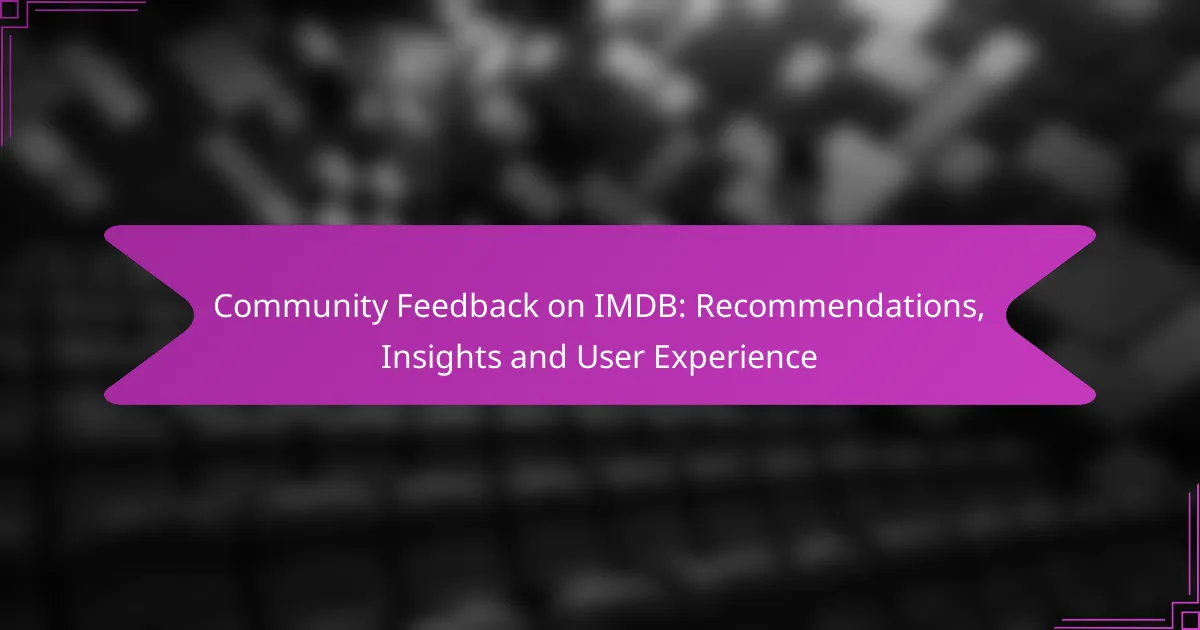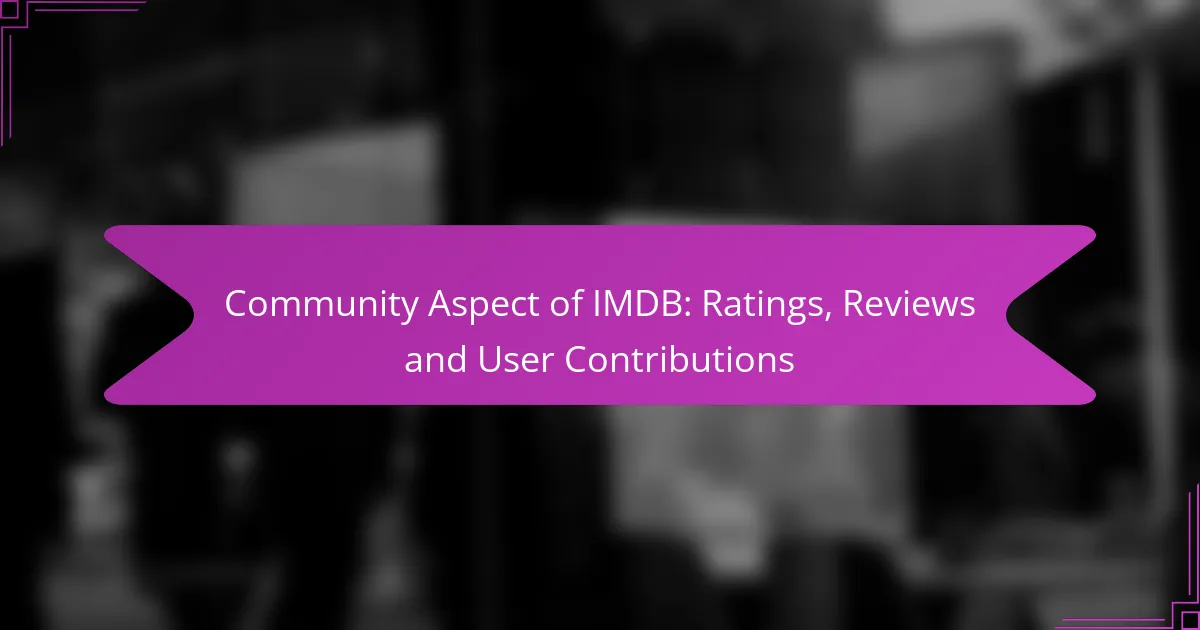Participating in IMDB discussions can significantly enhance your film analysis skills and foster connections with fellow enthusiasts. By actively engaging with the community, sharing insights, and responding thoughtfully, you can contribute to meaningful conversations that enrich your viewing experience. Utilizing the platform’s features and focusing on current topics will help you make the most of your discussions.

How to effectively participate in IMDB discussions?
To effectively participate in IMDB discussions, engage actively with the community by sharing insights and opinions on films. Focus on current topics, utilize the platform’s features, and respond thoughtfully to others to foster meaningful conversations.
Engage with current film topics
Stay updated on the latest film releases and industry news to engage in relevant discussions. Follow popular movies and trending topics to contribute your thoughts on what’s currently captivating audiences. This approach not only keeps your contributions timely but also attracts more responses from fellow users.
Consider joining conversations around film festivals, award nominations, or significant industry changes. These events often generate lively discussions that can enhance your visibility and credibility within the IMDB community.
Utilize IMDB’s discussion boards
IMDB’s discussion boards are a valuable resource for film enthusiasts to share opinions and analyses. Navigate to the specific movie or show page and participate in existing threads or start new discussions to express your views. Make sure to read the guidelines to ensure your posts align with community standards.
When posting, be clear and concise, and provide context for your opinions. This helps others understand your perspective and encourages more meaningful interactions.
Follow trending movie releases
Keeping an eye on trending movie releases allows you to engage in discussions that are relevant and popular. Use IMDB’s “Trending” section to identify films that are generating buzz and share your thoughts on them. This can lead to more engagement as many users are likely discussing these films.
Consider posting your reviews or thoughts shortly after a film’s release to capture the initial excitement and interest from the community.
Join genre-specific forums
Joining genre-specific forums within IMDB can enhance your discussions by connecting you with like-minded individuals. Whether you are a fan of horror, sci-fi, or romance, these specialized forums allow for deeper conversations about specific themes and styles.
Engage in these forums by sharing your favorite films, asking for recommendations, or discussing genre trends. This targeted approach can lead to more focused and passionate discussions.
Respond to user reviews
Responding to user reviews is a great way to engage with the community and express your own views. When you read a review that resonates with you, share your thoughts or provide a counterargument to foster dialogue. This not only shows your engagement but can also encourage others to respond to your posts.
Be respectful in your responses, even when disagreeing. Constructive criticism can lead to more productive discussions and help build a positive reputation within the IMDB community.

What are the benefits of engaging in IMDB discussions?
Engaging in IMDB discussions offers numerous advantages, including improved film analysis skills, enhanced community connections, and increased visibility for personal opinions. These benefits can enrich your viewing experience and foster meaningful interactions with fellow film enthusiasts.
Enhances film analysis skills
Participating in discussions on IMDB sharpens your ability to analyze films critically. By articulating your thoughts and responding to others, you develop a deeper understanding of cinematic techniques, themes, and character development.
To enhance your analysis skills, consider focusing on specific elements such as cinematography, screenplay structure, and character arcs. Engaging with diverse perspectives can also challenge your views and encourage more nuanced interpretations.
Builds community connections
IMDB discussions create opportunities to connect with like-minded individuals who share your passion for film. These interactions can lead to friendships, collaborative projects, and even local meetups centered around movie screenings or discussions.
To foster connections, actively respond to comments, ask questions, and share recommendations. Building a reputation as a thoughtful contributor can attract others to engage with you more frequently.
Increases visibility for opinions
Sharing your insights in IMDB discussions can boost the visibility of your opinions among a wider audience. Thoughtful contributions may receive recognition through upvotes or replies, amplifying your voice within the community.
To maximize visibility, focus on crafting well-reasoned arguments and engaging with trending topics. Consistency in participation can also help establish your presence, making your insights more likely to be noticed by others.

What are the best practices for film analysis on IMDB?
Effective film analysis on IMDB involves presenting clear, structured arguments that engage the community while drawing on established film theories and critiques. This approach not only enhances the quality of discussions but also fosters a deeper understanding of the films being analyzed.
Use structured arguments
Structured arguments are essential for clarity and persuasiveness in film analysis. Start with a clear thesis statement that outlines your main point, followed by supporting evidence and examples from the film. This logical flow helps readers follow your reasoning and engage with your insights.
When presenting your argument, consider using bullet points to highlight key aspects, such as character development, plot structure, and thematic elements. This format can make your analysis more digestible and impactful.
Incorporate film theory concepts
Integrating film theory concepts can elevate your analysis by providing a framework for understanding the film’s deeper meanings. Familiarize yourself with theories such as auteur theory, genre theory, and feminist film theory, and apply them to your observations.
For instance, when discussing a director’s style, reference auteur theory to highlight how their unique vision shapes the film. This not only enriches your analysis but also encourages others to think critically about the film’s artistic choices.
Reference other critiques
Referencing other critiques can lend credibility to your analysis and provide a broader context for your arguments. Look for reviews from established critics or popular film analysis websites to support your points or contrast your views with theirs.
When citing other critiques, ensure you summarize their main arguments accurately and explain how they relate to your analysis. This practice not only enhances your credibility but also invites further discussion among IMDB users, fostering a collaborative environment.

How to navigate IMDB’s discussion features?
Navigating IMDB’s discussion features involves understanding how to effectively use the platform’s tools for engaging with film-related conversations. Key features include search filters, bookmarking threads, and reporting inappropriate content, all of which enhance your experience and interaction with the community.
Utilize search filters
Search filters on IMDB allow you to refine discussions based on various criteria, such as keywords, date, or relevance. This helps you quickly find specific topics or threads that interest you, saving time and improving your engagement.
To use search filters, simply enter your query in the search bar and apply the available filters. For instance, you might look for discussions about a particular film released in the last year or focus on threads with the most recent activity.
Bookmark favorite threads
Bookmarking threads on IMDB is a practical way to keep track of discussions you want to revisit. This feature allows you to save your favorite conversations, making it easier to follow ongoing debates or updates without searching each time.
To bookmark a thread, click the bookmark icon next to the discussion title. You can later access all your saved threads from your profile, ensuring you never lose track of important conversations.
Report inappropriate content
Reporting inappropriate content is essential for maintaining a respectful and constructive environment on IMDB. If you encounter offensive or irrelevant posts, you can report them to help keep discussions focused and safe for all users.
To report a post, click on the report option available next to the comment. Provide a brief explanation of why you believe the content is inappropriate. This action contributes to a healthier community and ensures that IMDB remains a welcoming space for film analysis and discussion.

What are the common pitfalls in IMDB discussions?
Common pitfalls in IMDB discussions include personal attacks and spoilers, which can derail constructive conversations and alienate participants. Recognizing and avoiding these issues is essential for fostering a respectful and engaging environment.
Avoiding personal attacks
Personal attacks can quickly escalate tensions and lead to unproductive exchanges. It’s crucial to focus on the film or topic at hand rather than targeting individuals. When disagreements arise, express your views respectfully and back them up with reasoning.
To maintain a positive atmosphere, consider using phrases like “I disagree because…” instead of making accusatory statements. This approach encourages dialogue and helps keep discussions centered on the content rather than personal grievances.
Steering clear of spoilers
Spoilers can significantly impact the viewing experience for others, so it’s important to avoid revealing key plot points in discussions. Use spoiler tags or clearly label your comments if you must discuss critical elements of a film.
A good rule of thumb is to wait at least a few weeks after a film’s release before discussing major twists openly. This allows more viewers to experience the film without prior knowledge of its surprises, fostering a more inclusive discussion environment.



